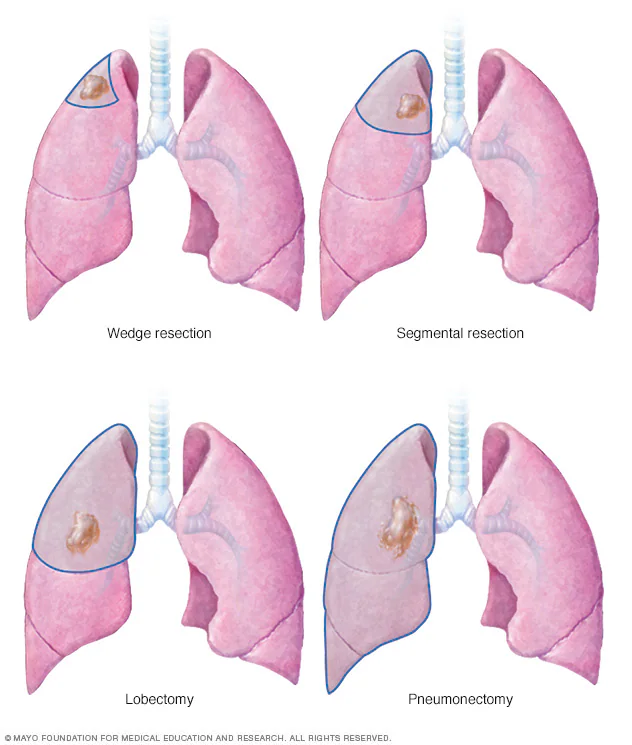Dr. Shilpa Gandhi | Leading Consultant Minimally Invasive Thoracic Surgeon In Nagpur
Meet Our Doctor
Dr. Shilpa Gandhi
MBBS, DNB General Surgery DNB Thoracic Surgery
Dr. Shilpa Gandhi is a trusted and experienced healthcare professional known for her compassionate care and expertise. Committed to delivering personalized treatments and improving patient well-being.


Lung Resection Surgery
Lung Resection Surgery is a critical surgical procedure performed to remove a portion or the entire lung to treat various lung-related diseases and conditions, including lung cancer, infections, and trauma. It is one of the most common thoracic surgeries and plays a vital role in improving a patient’s quality of life or curing potentially life-threatening conditions.
Lung Resection Surgery is a vital procedure that involves the removal of a part or the entirety of a lung to treat severe lung conditions such as cancer, infections, and trauma. It is often recommended for patients when other treatments like medication or radiation fail to resolve the issue or when a surgical approach offers the best chance of a cure.
What is Lung Resection Surgery?
Lung Resection Surgery is a procedure in which a part of the lung and, in some cases, the entire lung is surgically removed. This surgery is primarily performed to treat diseases that severely affect lung function or pose a threat to a patient’s health.
The type of lung resection depends on the condition being treated and the extent of the disease. Commonly, lung resection surgery is used to manage lung cancer, infections, trauma, and benign tumors.
Types of Lung Resection Surgery
There are several types of lung resection surgeries, depending on how much lung tissue needs to be removed:
1. Wedge Resection
- What it Involves: The removal of a small, wedge-shaped portion of the lung containing abnormal tissue, along with some surrounding healthy tissue.
- Uses: Often used for early-stage lung cancer or non-cancerous lung nodules.
2. Segmentectomy
- What it Involves: The removal of a larger section of the lung than a wedge resection but less than a lobectomy. It removes an entire segment of a lobe.
- Uses: Typically performed when the affected area is small, and preserving lung function is critical.
3. Lobectomy
- What it Involves: The removal of an entire lobe of the lung (each lung has lobes: three on the right lung, two on the left).
- Uses: The most common type of lung resection surgery, often performed for lung cancer or large infections.
4. Pneumonectomy
- What it Involves: The removal of an entire lung.
- Uses: Reserved for severe cases, such as extensive lung cancer or irreparable lung damage.
Conditions Treated with Lung Resection Surgery
Lung Resection Surgery is used to treat a wide range of conditions, including:
1. Lung Cancer
- The most common reason for lung resection surgery. It helps remove cancerous tissue to prevent the spread of the disease.
2. Benign Lung Tumors
- Non-cancerous growths that may cause breathing issues or other complications.
3. Severe Lung Infections
- Conditions like tuberculosis, fungal infections, or abscesses that damage lung tissue.
4. Chronic Obstructive Pulmonary Disease (COPD)
- In some cases, removing damaged lung tissue can improve lung function and breathing.
5. Trauma or Injury
- For repairing or removing damaged lung tissue after severe chest trauma.
How is Lung Resection Surgery Performed?
Lung resection surgery can be performed using two primary approaches:
1. Open Thoracotomy
- A traditional method where a large incision is made in the chest to access the lungs.
- Ideal for complex cases or when extensive access is needed.
2. Minimally Invasive Techniques
- Video-Assisted Thoracic Surgery (VATS): Involves small incisions and a camera to guide the surgeon.
- Robotic-Assisted Surgery: Uses robotic technology for enhanced precision and smaller incisions.
- These methods offer faster recovery, less pain, and smaller scars compared to open thoracotomy.
Benefits of Lung Resection Surgery
Lung resection surgery offers several life-saving and life-enhancing benefits:
- Effective Treatment for Lung Cancer: Removes cancerous tissue and prevents disease progression.
- Improved Breathing and Lung Function: Helps in cases where diseased tissue is impairing lung function.
- Higher Quality of Life: Eliminates or reduces symptoms like chronic pain, coughing, and shortness of breath.
- Potentially Life-Saving: In cases of severe infections, trauma, or cancer, lung resection surgery can save a patient’s life.
Risks and Complications
As with any major surgery, Lung Resection Surgery has potential risks, including:
- Bleeding: Due to the extensive vascular network in the lungs.
- Infections: Risk of pneumonia or surgical site infections.
- Air Leaks: Air escaping from the lungs into the chest cavity.
- Breathing Difficulties: Especially for patients with underlying lung diseases.
- Prolonged Recovery Time: Open surgeries may require longer hospital stays and recovery periods.
Lung Resection Surgery vs. Alternative Treatments
While alternatives like chemotherapy, radiation therapy, or targeted therapies are available, lung resection surgery remains the best option for many conditions, particularly localized lung cancer. Here’s why:
- Curative Potential: Surgery can completely remove the diseased tissue in many cases.
- Faster Results: Provides immediate relief compared to prolonged medical therapies.
- Combination Therapy: Often used alongside chemotherapy or radiation for comprehensive treatment.
Preparing for Lung Resection Surgery
To ensure a successful procedure or smooth recovery:
- Quit Smoking: Smoking reduces lung function and slows healing.
- Undergo Pre-Surgery Tests: Imaging tests, blood work, and pulmonary function tests will be conducted.
- Discuss Medications: Inform your doctor of all medications you’re taking to avoid complications.
- Arrange Support: Ensure help is available during your recovery period at home.
Conclusion
Lung Resection Surgery is a highly effective procedure for treating lung cancer, infections, and other lung-related conditions. While it is a major surgery, advancements in technology and surgical techniques have made the procedure safer and more efficient than ever before.
If you or a loved one is considering lung resection surgery, consult a qualified thoracic surgeon to discuss your condition, treatment options, and recovery plan. With expert care and proper preparation, this surgery can be life-changing, providing relief from symptoms and paving the way to better health.



